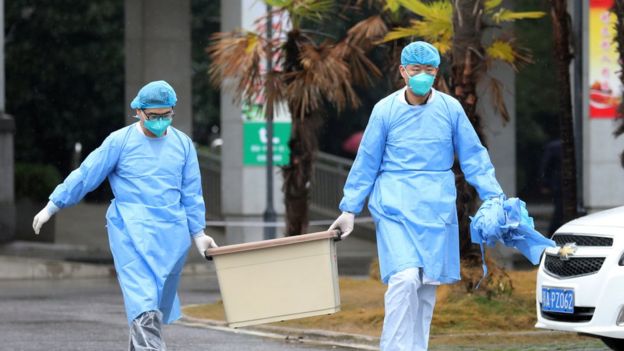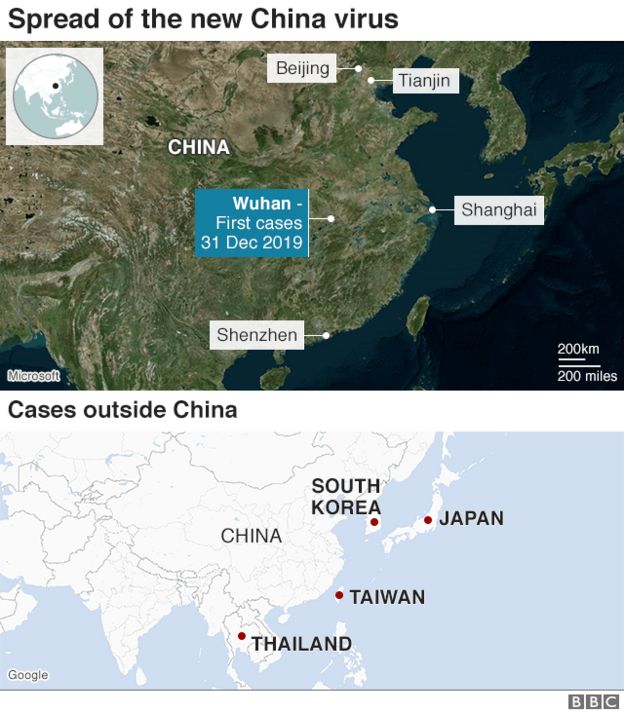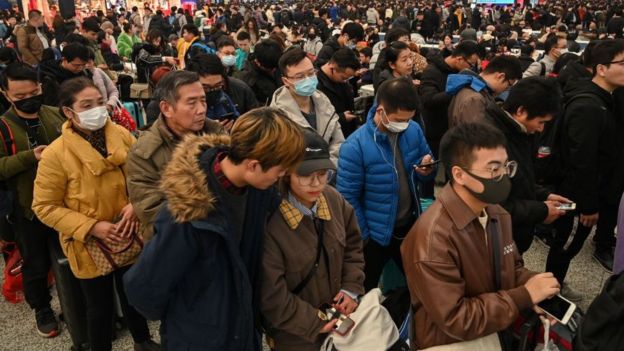New China virus: Warning against cover-up as number of cases jumps

China's top leaders have warned lower-level officials not to cover up the spread of a new coronavirus that has now infected nearly 300 people.
Anyone who concealed new cases would "be nailed on the pillar of shame for eternity", the political body responsible for law and order said.
The warning came as state media said six people had now died from the virus, which causes a type of pneumonia.
It's been confirmed the virus can pass from person to person.
The World Health Organization (WHO) will on Wednesday consider declaring an international public health emergency over the virus - as it did with swine flu and Ebola. Such a declaration, if made, will be seen as an urgent call for a co-ordinated international response.
China's National Health Commission on Monday confirmed for the first time that the infection could be transmitted from human-to-human. It said two people in Guangdong province had been infected in this way.
In a separate statement, the Wuhan Municipal Health Commission said at least 15 medical workers in Wuhan have also been infected with the virus, with one in a critical condition.
The workers presumably became infected with the virus due to contact with patients. All of them are being kept in isolation while being treated.
 REUTERS
REUTERSWhere has the virus spread?
A total of 291 cases have now been reported across major cities in China, including Beijing and Shanghai. However most patients are in Wuhan, the central city of 11 million at the heart of the outbreak.
The disease was first identified there late last year and the outbreak is believed to be linked to a seafood market that also sells live animals.
- Your questions answered
- How worried should we be?
- New Chinese virus 'will have infected hundreds'
- China drug makers soar on virus contagion fears
A handful of cases have also been identified abroad: two in Thailand, one in Japan, one in South Korea and one in Taiwan. Those infected had recently returned from Wuhan.


Authorities in many places, including Australia, Singapore, Hong Kong, Taiwan and Japan have stepped up screening of air passengers from Wuhan. US authorities last week announced similar measures at airports in San Francisco, Los Angeles and New York.
In Australia, a man who had travelled to Wuhan has been placed in isolation and is undergoing tests. China is the largest source of tourists to Australia, with more than one million people visiting last year.
How fast is it spreading?
There are fears that the virus could spread swiftly - and further across the country - as millions of people across China prepare to travel home for the Chinese New Year holidays later this week.
 GETTY IMAGES
GETTY IMAGES
This mass movement of people could also mean that authorities will not be able to monitor further spread of the disease.
And experts say there already could be many cases going undetected.
A report by the MRC Centre for Global Infectious Disease Analysis at Imperial College London suggested there could be more than 1,700 infections. However, Gabriel Leung, the dean of medicine at the University of Hong Kong, put the figure closer to 1,300.
Why are there warnings against a cover-up?
The outbreak has revived memories of the Sars virus - also a coronavirus originating in China - that killed 774 people in the early 2000s across several countries, mostly in Asia.
China initially withheld information about the epidemic from the public. It later vastly under-reported the number of people that had been infected, downplayed the risks and failed to provide timely information that experts say could have saved lives.
Analysis of the genetic code of the new virus shows it is more closely related to Sars than any other human coronavirus.
Chinese President Xi Jinping has called for "all-out efforts" to control the outbreak, according to state media, including quickly making information available and taking measures to "guide public opinion".
In its commentary published online on Tuesday, the Communist Party's Central Political and Legal Commission talked of China having learned a "painful lesson" from the Sars epidemic and called for the public to be kept informed.
Deception, it warned, could "turn a controllable natural disaster into a man-made disaster".
What do we know about the virus?
The virus, known also as 2019-nCoV, is understood to be a new strain of coronavirus that has not previously been identified in humans.
It is believed to have originated from infected animals at a seafood and wildlife market in Wuhan.

Coronaviruses are a broad family of viruses, but only six (the new one would make it seven) are known to infect people.
The World Health Organization has advised people to avoid "unprotected" contact with live animals, thoroughly cook meat and eggs, and avoid close contact with anyone with cold or flu-like symptoms.
Signs of infection include respiratory symptoms, fever, cough, shortness of breath and breathing difficulties.
No comments:
Post a Comment
Comments always welcome!